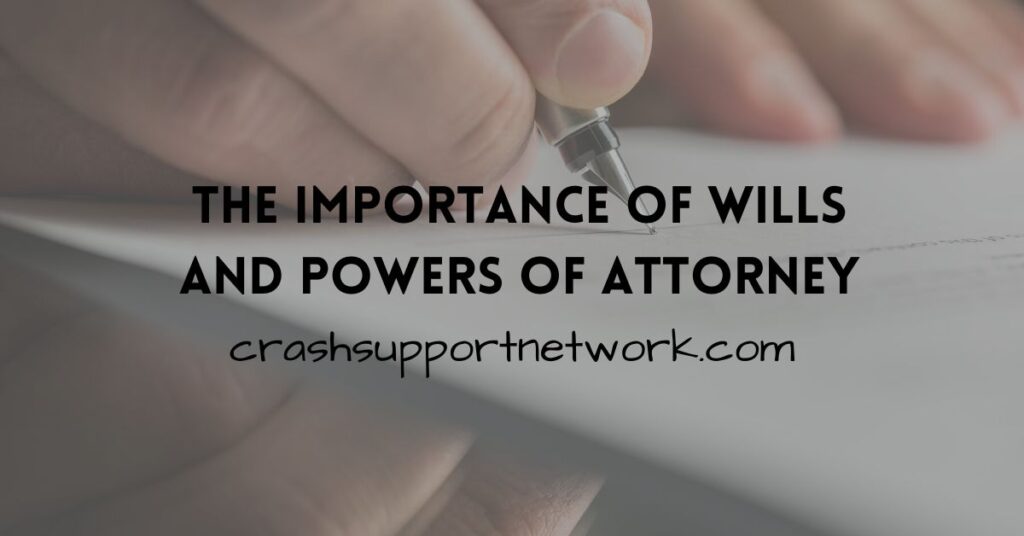
Having Wills and Powers of Attorney are important. Nobody knows when an automobile accident will occur, and what effect this could have on a person’s health and their family’s well-being. Having a will and Power of Attorney can take away the uncertainty in determining an accident victim’s wishes in the event of injury or death, and prevent familial conflict when one does not leave direction as to how they would like their property, and themselves to be looked after. Given the unpredictability involved in automobile accidents – and life in general – it is never too early to complete a will and Power of Attorney while you are healthy to ensure your wishes and preferences are respected.
A Will Gives You The Power To Decide
A will is an important estate planning tool for any individual who wants to decide how to divide their property. Without one, the laws of intestacy prevail and the distribution of your estate is determined by reference to the Succession Law Reform Act (more on that later). A will empowers people to name their own executor(s), name guardians for their children, create trusts for children or disabled family members, and even forgive certain debts.
What is a Power of Attorney?
There are two main types of Power of Attorney in Ontario: (1) Power of Attorney for Property; and (2) Powers of Attorney for Personal Care. There are two different types of Powers of Attorney for Property, being either a limited Power of Attorney for Property or a Continued Power of Attorney for Property. Both give authority to a person chosen by the grantor to act on their behalf. The difference is whether this power is limited to a specific transaction, time, or event, or whether it is a general ability to act for the signor that will persist beyond the point when the signor loses capacity. A Power of Attorney for Property can ensure that the property is maintained, and the bills are paid to safeguard the property.
A Power of Attorney for Personal Care takes effect only when the grantor loses capacity and ensures that a person of the grantor’s choosing can make their important healthcare decisions. This can be everything from the place the grantor will be living, the food they will eat, to the healthcare treatments that will be administered.
Why Do I Need To Worry About Wills and Powers of Attorney If I Am Young and Healthy?
Waiting until later in life to create a will and Powers of Attorney can cause numerous problems. An unexpected accident could leave an individual incapacitated, after which point any will or Power of Attorney they sign would be invalid.
Avoid Uncertainty and Family Conflict
Wills and Powers of Attorney can be an invaluable tool to make clear your wishes, and to avoid family conflict. When an intestate person dies or loses capacity, the family is often left in disagreement about what the persons wishes would have been if they had directed their own will and Powers of Attorney. The rules of intestacy may dictate which family members get a percentage share of the total value of your estate, but it does not establish who should act as executor; nor does it deal with certain details: i.e. who gets specific personal belongings, who you wish to act as guardian for your children if your spouse is also predeceased, etc.
Having a will can reduce speculation and arguments between family members; something that can provide parties an invaluable peace of mind. This situation of family conflict and estate litigation is becoming more prevalent as divorces, blended families, and estranged family members becomes increasingly common.
What If I Don’t Have a Will?
Without a will, the provincial laws of intestacy dictate how a deceased person’s property is to be divided. In Ontario, the Succession Law Reform Act outlines the order of intestate succession. For example, where the deceased is survived by a spouse but no children, the spouse is entitled to the property absolutely. Where the deceased is survived by a spouse and children, the spouse receives the first $200,000 of the deceased’s estate with the remainder divided between the spouse and children in proportions set out in the Act depending on the number of children. If there is no surviving spouse or children, the estate passes to a deceased’s parents, and if the parents are pre-deceased, to siblings. To avoid the state deciding how you should divide your property, draft a will when you are healthy and with capacity to make your own decision on how to distribute your estate.
Having a will drafted can be a much simpler process than you may expect. In many cases, it is not necessary for you to take inventory of all your assets and liabilities; aside from specific gifts to friends and relatives that you may want to set out, a will can distribute the entirety of your assets owned in proportions (whether equal or not) to your desired beneficiaries without having to list them out. In any case, having a conversation with a lawyer about your estate plan is a good starting point.
Submitted by Roy Hwang, Partner Epstein & Associates
For more information please visit: www.epsteinlawyers.com.
Epstein & Associates are members of the Crash Support Network and we thank them for their support.
This article is also featured in our 2019 Winter Issue of Sharing our Recovery
The Crash Support Network is a unique website consisting of an online support group, a Crash Survivor Blog written by a survivor, our Sharing Our Recovery Newsletter, informative articles and a Virtual Crash Memorial. Our website is based on relationship-building and puts the needs of survivors first by creating a helpful resource for victims and survivors of motor vehicle crashes.





